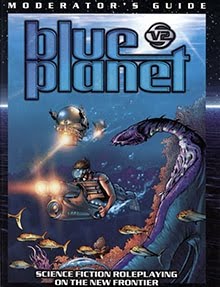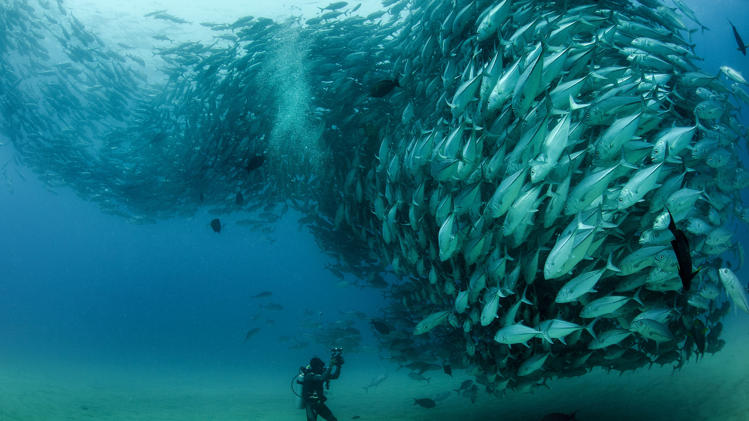So last year on #RPGaDAY, I was wondering why there was no “favorite RPG setting”. Rather than that topic, the topic was Game you’d like to see a new/improved edition of So I sort of answered the setting question with this topic. My thoughts on favorite setting were addressed this year, back on Day 21. Compare and contrast, you’ll find the same game.
Blue Planet has a great setting and a very awkwardly-implemented system. As far as the setting goes, keep it. It’s fantastic.
A quick synopsis of the setting: There’s a small colonization effort to a newly-discovered planet. Seriously bad things happen back on Earth and the colonists are written off. Nearly a century later, Earth is recovering and they send out more colonists and discover that not only did the original colonists not die out, they flourished. Unobtanium is discovered on the new planet and suddenly there’s a huge gold rush: the population goes from 70,000 to over two million in a decade. Corporate greed, people wanting to escape a hellish existence back on Earth, “natives” who want to preserve the planet — all these pressures come into conflict.
 The system is actually pretty good. But: while the system is pretty good, it isn’t treated right for the game. The way the system works is the better you naturally are at a thing, the more dice you roll; the more trained you are at a thing, the better the number you need to roll on at least one die. You’re a people person? Here, roll three ten-sided dice when trying to bluff your way past them. Get a 5 or better on any of those three dice and you do it. Not that good? Roll one die and beat an eight.
The system is actually pretty good. But: while the system is pretty good, it isn’t treated right for the game. The way the system works is the better you naturally are at a thing, the more dice you roll; the more trained you are at a thing, the better the number you need to roll on at least one die. You’re a people person? Here, roll three ten-sided dice when trying to bluff your way past them. Get a 5 or better on any of those three dice and you do it. Not that good? Roll one die and beat an eight.
Where the system fails is the skill and attribute mix. This is a game where your sense of smell is as important as your physical strength, according to the attribute breakdown. It’s a game that breaks down every learned thing into different skills (over ninety in BPv2!). There are six or seven different ways to convince people to do things (fast talking, conning, bluffing, persuading, et. al.). It’s an attempt to make a generic role-playing game that doesn’t address what the players should do.
It’s my belief that a game system should inform the style of play the game is intended to do. Take a look at D&D 4e —“ everything in that game reinforces that you’re supposed to go into large battle zones and fight monsters. Take a look at Atomic Robo — the skill list points play in a certain direction as do the skill modes you take to create your character. When there’s four basic skill groups and one of them is SCIENCE!, that says something about how the game is supposed to be played.
 There is no guidance in Blue Planet’s system that says what type of game this should be. Why does my bartender in a resort town that gets in over his head with a terrorist group have a skill rating in zero-g maneuvering, pharmacology, and shepherding? Are those skills really going to come into play in this game?
There is no guidance in Blue Planet’s system that says what type of game this should be. Why does my bartender in a resort town that gets in over his head with a terrorist group have a skill rating in zero-g maneuvering, pharmacology, and shepherding? Are those skills really going to come into play in this game?
Also, there’s no way to quickly generate NPCs in the game. Each character is created through a lifepath: Where were you born? What type of childhood did you have? What did you do after you got out of school? So if you want to bluff your way past a bouncer at a club, you have to ask where was that guy born? How was his childhood like? And on. And on.
Oh, but a few tweaks to the skill and attribute list is really all that is needed to drive play towards a design goal rather than “go play in a big sandbox filled with water” Give me a sandbox, but put some walls around it.
The other cool thing about Blue Planet as a game is it gives the complete game to you. The timeline goes up to a certain point and from then on, what happens on Poseidon, stays on your Poseidon. This is fantastic and something I would strongly advocate for in a Blue Planet v3.


